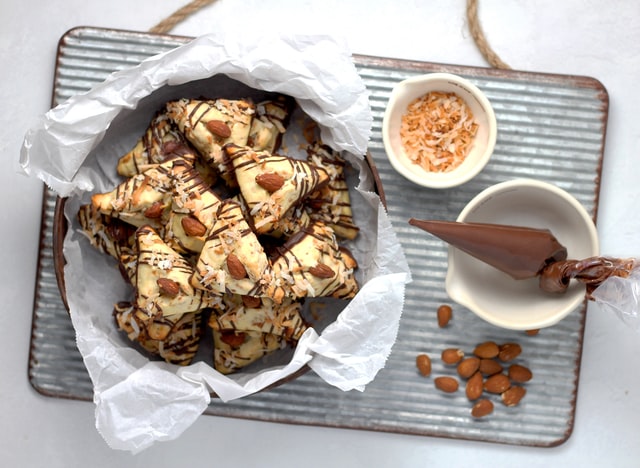The joyous festival of Purim shares many connections with veganism. According to the Talmud (Megilla 13a), Queen Esther, the heroine of the Purim story, was a vegetarian while she lived in the palace of King Achashverosh. She was thus able to avoid violating the kosher dietary laws while keeping her Jewish identity secret.
During Purim it is a mitzvah to give mat’not evyonim (added charity to poor and hungry people). In contrast to these acts of sharing and compassion, animal-based diets involve the feeding of almost 70 percent of the grain in the United States to animals, while an estimated nine million people die of hunger and its effects annually.
During the afternoon of Purim, Jews have a seudah (special festive meal), at which family and friends gather to rejoice in the Purim spirit. Serving only vegan food at this occasion would enable all who partake to be consistent with Jewish mandates to preserve health, protect the environment, share with hungry people, conserve resources, and treat animals with compassion.
On Purim, Jews emphasize unity and friendship by sending gifts of food (shalach manot) to friends. Vegans act in the spirit of unity and concern for humanity by having a diet that best shares Earth’s abundant resources. Because of the deliverance of the Jewish people that it commemorates, Purim is the most joyous Jewish holiday. By contrast, animals on factory farms never have a pleasant day, and millions of people throughout the world are too involved in worrying about their next meal to be able to experience many joyous moments.
Mordechai, one of the heroes of the Purim story, was a nonconformist. The Book of Esther affirms: “And all of the king’s servants . . . bowed down and prostrated themselves before Haman. . . . But Mordechai would not bow down nor prostrate himself before him” (Esther 3:2). Today, vegans represent non-conformity. At a time when most people in the wealthier countries think of animal products as the main part of their meals, when McDonald’s and similar fast-food establishments are expanding, vegans are resisting and insisting that there is a better, healthier, more humane diet.
Purim commemorates the deliverance of the Jews from the wicked Haman. Today, veganism can be a step toward deliverance from modern problems such as climate change, hunger, pollution, and resource scarcities.
Purim commemorates the time when conditions for the Jews changed from sorrow to gladness and from mourning to celebrating. Today, a switch to veganism could result in positive changes for many people, since plant-based diets would reduce health problems and hunger.
Jews hear the reading of the Megillah twice during Purim, in order to re-educate themselves about the terrible threats that faced the Jewish people and their deliverance. Jewish vegans believe that if Jews were educated about the horrible realities of factory farming and the powerful Jewish mandates about taking care of our health, showing compassion to animals, protecting the environment, conserving natural resources, and helping hungry people, they would seriously consider switching to vegan diets.
============
My Purimshpiel
Reb Henna taught: “Which came first, the chicken or the egg? Clearly, the chicken. How do we know this? We learn from Megillat Esther that when Mordecai asked Esther to go before King Ahashveros to plead for the Jewish people, she was ‘chicken,’ fearing for her life. Only when Mordecai ‘egged’ her on, telling her that perhaps she was enabled to be queen for just this EGGcelent purpose, did she muster the courage and ‘scrambled’ to appear before the king.”
Reb Roosta said, “Speaking of birds, I heard that a Heavenly voice once announced: ‘A Robin Redbreast in a cage puts all Heaven in a rage’”. (William Blake, “Auguries of Innocence”) Reb Chicka responded, “Not to EGGaggerate, but – If a robin redbreast in a cage puts all heaven in a rage, how feels heaven when, dies the billionth battery hen?” (Spike Mulligan, British comedian) Reb Poultrie stated, “Since Queen Esther was a vegetarian to avoid violating the dietary laws while hiding her Jewish identity while in the palace of King Ahashveros (Megilla 13a), and since our esteemed editor, Rabbi Judah, the Prince was stricken with pain for many years because he callously treated a frightened calf, perhaps we should egg on Jews to protest against the current horrible treatment of chickens and other animals.




















